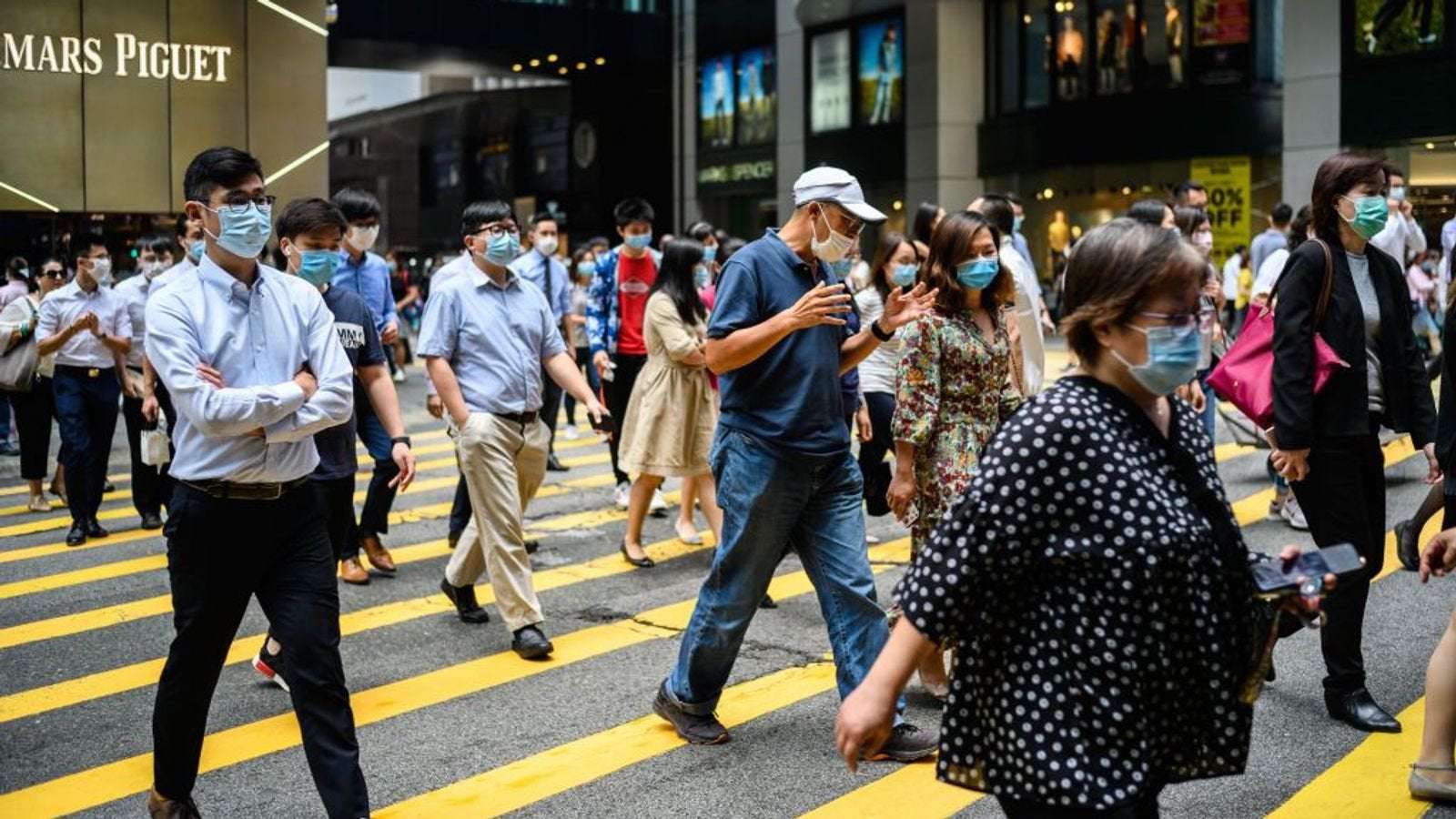Wearing surgical masks can significantly reduce the chances of those with COVID-19 infecting others, researchers have claimed.
According to a study by a team in Hong Kong, the rate at which the virus was transmitted through airborne particles or respiratory droplets was lowered by as much as 75% when masks were used.
"The findings implied to the world and the public is that the effectiveness of mask-wearing against the coronavirus pandemic is huge," leading microbiologist Dr Yuen Kwok-yung, from Hong Kong University, said on Sunday.
Image: The UK government is now advising people to wear masks where they cannot practise social distancing
Dr Yuen, who helped discover the SARS virus in 2003, said the study was the first of its kind.
He said that his team conducted the study because - while he has long supported wearing masks - world leaders, including the World Health Organisation (WHO), had questioned their effectiveness.
The study saw his team use two cages of hamsters in three different scenarios.
One group was infected with COVID-19 and the other was healthy, with a fan used to push air towards the infected animals - some which did not show symptoms.
Researchers said they found that without any masks between the cages, two-thirds of the healthy hamsters were infected within a week.
But when they placed masks on the cage with infected animals, the infection rate dropped to just over 15%.
The infection rate dropped by about 35% when masks were placed on the healthy hamsters' cage.
Those hamsters that did become infected were also found to have less of the virus in their bodies than those who were infected without a mask, the research found.
'Wear a facemask if you can't social distance'
Dr Yuen told a press conference on Sunday: "In our hamster experiment, it shows very clearly that if infected hamsters or humans - especially asymptomatic or symptomatic ones - put on masks, they actually protect other people.
"That's the strongest result we showed here. Transmission can be reduced by 50% when surgical masks are used, especially when masks are worn by infected individuals.
"Up to this stage, we do not have a safe and effective vaccine.
"What remains practical is still either social-distancing measures or wearing masks."
:: Listen to Sophy Ridge on Sunday on Apple Podcasts, Google Podcasts, Spotify, Spreaker
The UK government initially said face masks could not protect people, but it has revised its advice and is now recommending people wear face coverings where they cannot remain two metres apart in settings such as small shops and on public transport.
European countries including Italy and Germany have said people should wear masks in such settings.
At the start of the pandemic, which started in China, there was a rush to buy face masks in Hong Kong, where people remember the impact of SARS.
Hong Kong suffered 298 deaths from SARS, second only to mainland China, but the territory has only reported four fatalities from COVID-19.
Walking around without a face mask in Hong Kong, Japan or North Korea is seen as irresponsible, and several US states are also now advising people to wear them when out.

WeAreABridge on May 19th, 2020 at 06:43 UTC »
As other people pointed out, this study is not linked in the article, and is conducted on hamsters.
It doesn't list what number of hamsters there are, and I'm not sure placing a mask on a cage then blowing air with a fan is necessarily a good analogue for how people use masks.
camphibious on May 19th, 2020 at 04:53 UTC »
Why is there no link to any peer reviewed research article?
SlightCarpet on May 19th, 2020 at 03:52 UTC »
I'm not one for conspiracy theories usually but I feel like 'masks not being effective at stopping spread' was deliberate misinformation to avoid a run on PPE so that as much could be (justifiably) kept for healthcare workers as possible until such time as PPE production stepped up.